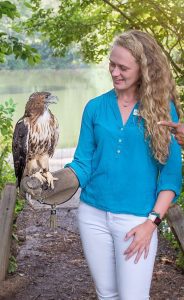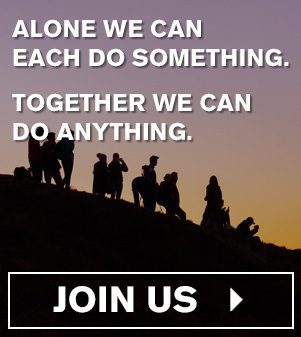Alicia Evans
Senior Director of Community Programs, Chattahoochee Nature Center, Atlanta

Alicia Evans has been with the Chattahoochee Nature Center (CNC) in the metro Atlanta area since 2007. She grew up in Atlanta and has always loved nature and the outdoors, but it wasn’t until she learned that “environmental education” was something she could study in college that she realized she could turn it into a career.
Evans, senior director of community programs at CNC, is passionate about sharing nature with children – to show them the possibilities the outdoors holds for them, as both a wonderful place to pass the time and as a potential career. We asked her about CNC’s work with the Thrive Outside program and why it’s vital to understand and meet basic safety needs for families as they’re introduced to the outdoors.
Tell us a little bit about what the Nature Center is doing as part of the Thrive Outside program.
Atlanta is such a diverse community, so depending on where you go, access to and awareness of the outdoors and environment aren’t equal. Grants like this allow us to start with awareness and to help children learn that it’s fun to be outside and there are so many things to explore. It’s a great, healthy way to stay active and show them the outdoor opportunities Atlanta has to offer. Our center is right on the Chattahoochee River, which is the major waterway for the city. So in our programming—we host programs on-site and deliver outreach programming to meet them where they are, at youth centers and organizations like the Boys and Girls Club and YMCA – we teach kids how it’s all connected – about the watershed, and its effects all of us and even how we can impact the water we drink at home. We help them understand that they have an opportunity to make a positive impact on the environment as a whole, from the water quality to the birds they hear to the plants they see. The funding from Thrive Outside has really helped us reach these communities, be able to take down barriers in them that exist for access and to bring the outdoors to them.
What drives your passion for this work?
When I graduated from the Warnell School of Forestry at the University of Georgia, I thought that I was going to do research as a traveling wildlife biologist. But I realized that I love my home, Atlanta. I came to CNC as a camp counselor initially, taking eighth and ninth graders out on trips, and then I started as a naturalist, teaching environmental education programs.
What’s fun about teaching people about nature is watching them have that “aha moment” we all love to talk about as environmental educators – the moment where it clicks, when you realize you may have discovered that you want to learn more about the outdoors, about nature. My aha moment was when I was a child, and my grandmother taught me what a chickadee was when we were looking at birds out the kitchen window. My aha about teaching others about nature was when I guided canoe trips in the Boundary Waters with Girl Scouts, gaining a deep appreciation of nature and wanting to share that with people. I understood why we should care about nature, I understood that everything is intertwined and I wanted to challenge myself to translate that message to others.
How have you seen the outdoors impact kids you’ve worked with?
In 2008, I had an opportunity to be a canoe guide on Paddle Georgia, a 100-plus-mile canoeing trip with the Georgia River Network. The Nature Center was tapped to guide a group of underserved students, and it was so hard but so rewarding. Some of the kids didn’t know how to swim – most had never been in a canoe. We worked with them over the week to build their personal strength, teamwork and self-confidence to be comfortable outdoors, skillfully paddle their own canoe and be proud of their accomplishments — all while being able to show them beautiful places across the state. Seeing time with nature change these kids – to give them confidence and an appreciation for the natural world – it’s powerful. It makes me emotional to think about it. It’s why I returned to lead this trip for these kids each year for 10 summers.
It’s fun to see the kids transform from feeling like “I’m not getting in a river” and maybe feeling a little anxious to feeling comfortable being outside, having fun and being so proud they beg to have their picture taken when they’re the one paddling the canoe. It’s amazing – almost a metamorphosis. It speaks to the value of nature and the success of programs like this. When you take away the electronics and all the other distractions and allow a child to focus on themselves and help them grow as a person, I think that’s a real “aha moment,” and it’s where my passion for this type of work comes from.
What are your hopes for what will come out of the Thrive Outside program?
The Thrive Outside program is a three-year program. Having one-time outdoor experiences is important, but this structure allows us to interact with children more deeply, on multiple occasions and to be a part of their growth over time. We allow them to become more comfortable in an outdoor setting, with snakes and bugs, or even hiking on a trail or paddling a canoe. I think it really helps broaden their perspectives and show them that everything has a purpose and that nature can be fun! Every leaf on the ground is important, and if you turn over a rock, you learn that that’s something’s habitat. We want to help them gain a sense of place and to start them on a journey that begins with an awareness of nature and sends them toward being a steward of the earth.
Reaching the kids is super valuable, but we also need to approach this journey from a family level. Often, adults need engagement with and introductions to the outdoors, too, in order to keep that thread alive. I would hope that this program enables the children to encourage their families to join them on the journey and that we can reach adults and help them foster an interest in the outdoors for themselves and their families.
What’s your dream for future generations of children?
My hope, first and foremost, is that there are more opportunities for green space in urban environments and that we prioritize that need for the people who live there. An organization like ours might be in a position to inspire someone to recognize that there’s nature everywhere and then go out and create green space for those in their community. Whether it’s a small plot or a big meadow, it doesn’t matter. We’re noticing it now with the pandemic—people are staying home, and all of a sudden, they’re like, “Oh my goodness. The air is clear, and there are birds singing. Where did all this nature come from?” I’m hopeful that this brings a reminder to everyone that you can’t escape nature; in fact, you need it. And you need to take care of it so that it takes care of you.
We also need to make sure that the outdoors feels safe for everyone. I remember when I was teaching outreach programming in an underserved area in Atlanta where community access and awareness of outdoor recreation are limited. We were at the Outdoor Activity Center in West Atlanta, about to head into the forest on a hike, and there was a child who — you could just tell by looking at him — was nervous. I asked him if he was excited to go hiking, and, I’ll never forget this. He said, “Miss Alicia, I just don’t want to go in there. That’s where the bad people are.” It was a different kind of “aha moment,” one where I realized the privilege I have that allows me to think of going hiking and get excited about it, rather than fear for my general safety. I think about that experience a lot. I regularly remind myself that being outdoors and what it means for me may not mean the same to others. When I am taking others outdoors, there may be fears—both spoken and unspoken—context and previous experiences unknown to me. You’re never going to reach somebody with your message unless their basic needs—safety, food, etc. — are cared for.
A good naturalist, a good interpreter, works to translate something previously misunderstood or unfamiliar—nature, in this case—and helps guide the learner—this young boy—to begin to understand and to have an appreciation of what was previously unknown. It is my hope that Chattahoochee Nature Center can successfully interpret nature for those who join us in our programming and make it fun, better understood, safe and potentially life-changing.




